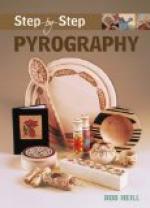No other house in the neighborhood was as old as that cottage. It was built of beams put together without nails and filled in with a rude wattle-work plastered thickly with coat after coat of mud. Instead of being thatched like most houses of its kind the roof had been covered with fine red tiles,—possibly Roman work. It seemed that the soil must have washed in over the ruins of the Roman building so very long ago that there had been time for trees to grow above it.
Thus Wilfrid reasoned. As his laborers dug and moiled and sweated under the hot clear sun, he watched with lively interest for whatever they might turn up. It is to be feared that Edwitha’s maids were less carefully looked after than usual after the work began, and the children spent every minute they could in following their mother or their father about to see what was going to happen.
There was another reason besides curiosity for keeping watch of the work. If any pottery should be discovered, Wilfrid did not wish to have it broken by a careless mattock.
Then Dorothy came running from the house to find her mother and father bending over a newly-unearthed Roman wall. “Father!” she cried, “a man is come to see you!”
“Oh!” said Wilfrid, not very eagerly. He brushed some of the earth from his clothes with a handful of weeds and went toward the gate, where a horseman sat awaiting him. As he came nearer the man dismounted and came toward him with outstretched hand.
“Alan!” cried the potter joyfully. “I heard you were abroad. Come in, and I’ll send for Edwitha.”
“Not so fast,” said his guest. “I am but a harbinger. Guy Bouverel and Master Gay the merchant with his wife and son, and some others, are coming along. We’ll stay at the Abbey, but we rode on to see you first. I’ve my wife with me, Wilfrid.”
“That’s news indeed,” said the potter cordially. “And who may she be? Some foreign damsel you met in your pilgrimage?”
“That’s one way of saying it,” answered Alan smiling. “You shall see her and judge for yourself. How’s all here?”
Wilfrid smiled rather sheepishly. “You and your wife must come and stay with us,” he insisted. “We’ll make you welcome, spite of being a bit upset. Edwitha has been taking holiday. We’re digging up the farm to see what’s at the other end of Cold Harbor, lad.”
“Make no ado about us,” Alan protested. “It’s partly about Cold Harbor that we came—but here they all are, upon my life!”
A merry company of travelers rode up the lane, and as they dismounted Edwitha came over the little footpath across the field, with the children clinging to her hands—a little embarrassed to find so many folk arriving and she not there. The boy scampered up to his father piping loudly, “Father, come you quick—we’ve found a picture in the ground!”
“What’s all this?” asked Master Gay. And after Wilfrid’s explanation nothing would do but that they all should go immediately to see what had come to light. When they beheld it the younger men could not keep from taking a hand themselves. With brooms of twigs, and potsherds, and water from the well in Cold Harbor, they industriously swept and scraped and washed the pavement which the men had now partly uncovered.




